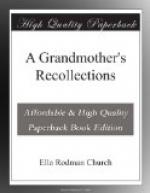Jane’s stories, as well as Mammy’s always began with “Once upon a time there were two sisters;” one was represented as plain-looking, but amiable—the other beautiful, but a very Zantippe in temper. By some wonderful combination of circumstances, the elder lost her beauty and ugliness at the same time—when some good fairy always came along, who, by a magic touch of her wand, made both the sisters far more lovely than the elder had been. Beauty was always the burden of the tale; people who were not beautiful met with no adventures, and seemed to lead a hum-drum sort of life; therefore, I insensibly learned to regard this wonderful possession as something very much to be desired. I believe I was quite a pretty child, with dark bright eyes, red lips, and a pair of very rosy cheeks. I spent considerable time before the glass, and both Mammy and Jane began to fear the effects of vanity. Often and often would the old nurse say: “You needn’t stand before the glass, Miss Amy—there is nothing to look at,” or when in a bad humor, “Don’t make such faces, child—you have no beauty to spare,” and I can very well remember how both would endeavor to persuade me that I was the most veritable little fright that ever existed, and quite a bugbear to my relations.
“What a pity,” Jane would commence, as she saw me surveying myself with an air of infinite satisfaction, “what a pity it is that Miss Amy has such a dark, ugly skin—almost like an Indian, isn’t it, nurse?”
I had eyes to judge for myself, and knew that I was much fairer than either Mammy or Jane; and somebody had remarked in my presence: “What a lovely neck and shoulders!” therefore I generally remained perfectly quiet while listening to these inuendoes.
“Yes,” Mammy would reply, “a very great pity—but an amiable temper, Miss Amy, is more than looks; you must try and cultivate that, to make up for your want of beauty.”
“And then,” continued Jane, “only see how perfectly straight her hair is! not a sign of curl, nor even a twist!—and black eyes have such a wicked kind of a look; they always remind me of cannibals.”
Jane’s eyes were as blue and bright as glass beads, while Mammy’s, I thought, approached a green, but with my own I felt perfectly satisfied; for a lady had remarked in my presence what beautiful eyes I had—adding that “dark eyes were so much more expressive than blue; blue ones were so very insipid looking.” The observation about my hair, though, was only too correct, and touched me most sensibly. While most of the other children possessed those soft, flowing curls, so beautiful in childhood, mine obstinately refused to wave; and was, to use Jane’s expression, “as straight and as stiff as a poker.” I had endeavored to remedy this as far as lay in my power, and one day set my hair in a blaze, while curling it with a very hot pipe-stem. I was, in consequence, deemed one of the most abandoned of the nursery inmates; and found myself minus at least one half of the hair I had hitherto possessed.




